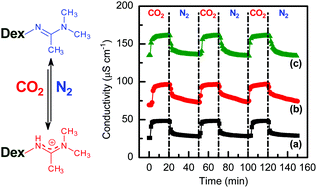Synthesis and properties of CO2-switchable Dex-g-PAHMA copolymers†
Abstract
Dextran graft poly((N-amidino)hexyl methacrylamide) (Dex-g-PAHMA) copolymers were synthesized by free radical polymerization in aqueous solution and characterized. Dex-g-PAHMA copolymers can self-assemble into micelles with the PAHMA rich core and dextran rich shell in aqueous media. The CO2 sensitivity of the micelles was investigated by dynamic light scattering (DLS), conductivity and zeta potential. The results confirmed that the Dex-g-PAHMA copolymer micelles have reversible CO2 sensitivity. The micelles can be used as doxorubicin (DOX) carriers and DOX molecules are mainly located in the core of the micelles. The MTT assay indicated that the Dex-g-PAHMA graft copolymers are non-toxic to cells in the copolymer concentration range of 5–1000 μg mL−1, whereas the relative cell viability is greatly reduced with the increase of copolymer concentration for DOX-loaded micelles. The DOX-loaded micelles can be endocytosed by MCF-7 cells and the DOX can release from micelles and diffuse into the cell nucleus. The Dex-g-PAHMA copolymers have promising applications as drug carriers for cancer therapy.


 Please wait while we load your content...
Please wait while we load your content...